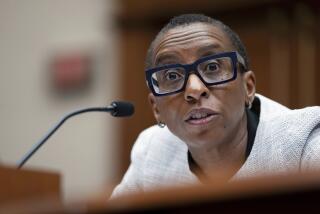New Task Forces on Women at Harvard
- Share via
BOSTON — Saying he hoped to “turn heat into light” after the recent controversy over his remarks on women in science, Harvard University President Lawrence H. Summers announced the appointment Thursday of two faculty task forces on women and pledged to create a senior administrative position to support gender diversity.
Summers said the committees, one on female faculty and the other on women in science and engineering, would report back this spring and recommendations would be implemented by the fall -- quickly by academic standards. Some recommendations could even be implemented sooner.
Summers’ comments at an academic conference last month -- suggesting that innate differences between the sexes might explain why women have trouble reaching top science jobs -- sparked criticism from many academics as well as Harvard faculty and alumni, though some who were present at Summers’ speech say he was misunderstood. Summers has issued several public apologies.
“This is not something any of us would have chosen,” Summers, speaking of the controversy, said in a telephone interview Thursday. But he added, “I think we now have a real opportunity to make great progress on these issues.”
Summers said he had committed to creating a senior administration post on gender diversity and had asked the committee on female faculty to propose a job description.
The task force on women will be chaired by Evelynn Hammonds, a professor of history of science and of African and African American studies. It will focus on improving searches for female faculty, ensuring they get fair consideration for promotion and exploring ways to support them in meeting family demands. It will also consider “targeted searches as a means of enhancing gender diversity on the faculty,” according to Harvard’s announcement.
The women in science task force will be led by Barbara Grosz, dean of science at Harvard’s Radcliffe Institute for Advanced Study. It will explore issues affecting the pool of female scientists, such as why women who major in science as undergraduates may not pursue science careers.
“The object of these task forces is not to study the problem, which has been extensively studied, but to propose a set of concrete measures,” Summers said.
More to Read
Sign up for Essential California
The most important California stories and recommendations in your inbox every morning.
You may occasionally receive promotional content from the Los Angeles Times.













